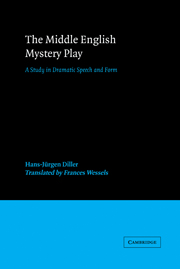Book contents
- Frontmatter
- Contents
- Preface
- Note on texts used
- Abbreviations and special symbols
- Introduction
- Part I The foil: Latin church drama
- Part II The English Creation to Doom cycle
- 5 The origins of the Creation to Doom cycle and its stage
- 6 The representation of time and space in the cycles
- 7 Address to the audience
- 8 Intra-dramatic speeches
- 9 Conclusions
- Notes
- Bibliography
- Indexes
7 - Address to the audience
Published online by Cambridge University Press: 04 March 2010
- Frontmatter
- Contents
- Preface
- Note on texts used
- Abbreviations and special symbols
- Introduction
- Part I The foil: Latin church drama
- Part II The English Creation to Doom cycle
- 5 The origins of the Creation to Doom cycle and its stage
- 6 The representation of time and space in the cycles
- 7 Address to the audience
- 8 Intra-dramatic speeches
- 9 Conclusions
- Notes
- Bibliography
- Indexes
Summary
General aspects
Liturgical ‘forerunners’
The audience-address has no true equivalent in the liturgical drama. It is, therefore, particularly suited to become a distinctive feature of the type of drama that has developed in the vernacular. The extent to which this type of dramatic speech is peculiar to the mystery play (and later to the morality play) can best be seen by passing briefly in review those sections of liturgical drama which have on occasion been regarded as early forms of the vernacular audience-address.
Berthold Venzmer and, in his wake, Karl Young, believed that the expository characters who appear in some mystery plays are foreshadowed in the narrative antiphons sung by the choir, the best-known of which is the Currebant duo of some extended versions of the Visitatio Sepulcri. Yet these antiphons - although they narrate and thus also inform - do not, strictly speaking, address anyone. Basically they perform the same function as the dramatic presentations themselves and the lections from the Bible (which they originally were): they praise God's deeds, and it does not matter who hears them - apart from the extollers and God himself. A further difference is that these utterances are purely narrative, while the function of the audience-address is above all to explain and instruct. It is significant that they always recount the action they accompany in the preterite. The vernacular expositor can use this tense only at the end of plays in summaries which generally deal just with those episodes not presented on stage.
- Type
- Chapter
- Information
- The Middle English Mystery PlayA Study in Dramatic Speech and Form, pp. 109 - 159Publisher: Cambridge University PressPrint publication year: 1992



